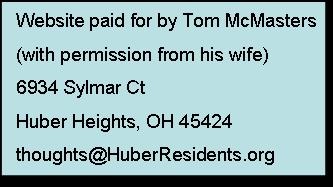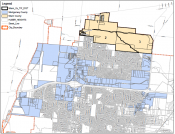I'm sitting down about two weeks before election day for the school levy and thought I would write out the reasons I see for and against the levy.
At first glance it would seem that there couldn't be anyone more likely to vote for the levy than me. I have four kids in Huber Heights City schools and another about to enter. I have the resources to send them to private school but I keep them in public schools because I believe that's how kids should be educated. I would not have trouble paying a tax increase if it is voted in. I have a Masters in Education and a Teachers License. Though I don't teach now, I have experience teaching middle school, high school, prep school and community college and consider teaching the most difficult, most time consuming and most demanding positions I've held. I believe that teachers are professionals and should be paid like professionals. Even with this background and these beliefs, I'm not going to make up my mind on how I'm going to vote until just before the polls close on election day. If I had to measure where I am today I'd say I'm 60% at no.
A small part of the reason I'm leaning toward no is because I am pro-union. I'll write about that later. A major reason I'm leaning no is captured best by the falsity of "Support our Schools". I personally would be 51% toward voting yes if the signs read "Support our Teachers". Almost everyone knows that about 80% of the school's operating budget goes to paying staff salaries. Yes, staff includes more than just teachers but "Support our Teachers" is much more upfront about where the money is going than the implication that voting for the levy is "for the kids". Voting for the levy this election based on a "for the kids" slogan separates the educators from any responsibility in the quality of education our kids receive. "Support our Teachers" or "Pay our Teachers" gives us as a community an invitation to discuss the real issue - money. "Pay our Teachers" shows recognition that the community is the employer and has the authority to convey to the employees that we expect school ratings to be as high as other communities, that we expect our students to be educated to the same level as private schools and we expect our schools reputation to be good enough to attract new people to Huber Heights. A slogan of "Support our Schools" makes it seem like someone thinks that they can convince us that if we throw a quarter in a wishing well magically our kids will study harder and more people will flock to live in Huber.
I know my having the perception that someone is trying to sell me a bill of goods affects my vote. Believe it or not I realize that I often form different opinions than a lot of other people. A lot of my friends tell me they aren't going to vote for the levy because "we can't afford it". Yet I know that in the last couple years some of them voted Yes on the library levy and Yes on the technology center levy. I have other friends that will vote No regardless of the issue and I have others that will vote Yes for practically every school levy. Still, there are a lot of us swing voters and from my conversations there are two major items school levy advocates will have to overcome. One is the perception that school officials and employees waste enormous amounts of money and the second is that school officials and employee unions are profiting by using deceptive arguments.
Whether you picked up on it or not - I'm trying to figure out any excuse possible to go from 60% no to 51% yes. But right now I'm thinking about the perception of waste. I'm pretty sure if I think about this long enough I'd go to 70% no. It has been a couple years now but I just can't get over when the school board voted to cut $3 million dollars from operating cost on the same night they decide to spend $700,000 on play ground equipment even though they were told they had a $40,000 playground alternative. Ever since that meeting I seem to always hear them when they say, "The state is paying half of it" and I always miss the discussion where they evaluate if the item is needed, what the alternatives are and if it is a good value. Instead I just hear, "Hey, we're fat on construction funds. Why do you care if we waste them". These incidents always make me lean more to voting no because I think, "the only way to get them to think about cost is to limit their money". I hate that an incident a couple years ago still plays such a large part in my thinking. Then again the last time I went to a school board meeting, they had a construction issue and about the only thing in the discussion was that this item still qualified for the state's 50% off coupon. Since the objective here is to figure out some way to get to 51% yes - I'll stop thinking about the waste and concentrate on the deception.
I personally believe that automatic cost of living increases is a primary cause of the current income gap between the rich and poor. The automatic adjustments are a primary reason for the disappearance of the middle class. These automatic adjustment have caused so much waste in the military because every program budgets for increases because there usually is an increase - but they don't evaluate if the specific item they plan to buy is likely to go up or down. So I have a natural bias against any automatic increase. It annoys me when people tell me that a budget or paycheck is "cut" because they aren't increasing as fast as they dreamed they were going to increase. Up until recently, I'd hear school officials claim that they were cutting 3, 5 even 8 million dollars yet every time I looked at the schools 5 year budget projections each year's expenditures were getting higher and higher. A look at the current 5 year projection and you see there are actual decreases planned. I personally want my tax money spent wisely and I am not willing to state that a decrease in spending necessarily means that the tax money is being spent more wisely. On the other hand if someone is going to tell me they are reducing spending then the amount they spend should be lower. So I'm glad to see that kind of progress reflected in the current 5 year plan.
I've only got about 3 pages of thoughts left -- Hope I get them worked through before election day.
In fact, one of the primary reasons I'm 60% No and not 75% No is because Ms Gunnell, Ms. Bernardo and the school administration have put in exactly the kind of effort I expect to see from someone that wanted my vote. They held a series of town hall type meetings seeking all kinds of comments on where to cut, where to gain and how to proceed. They got the administrative personnel to take an actual pay reduction of 3% as well as a net pay reduction due to increased insurance responsibilities. And they have put in really long hours talking to the community, other schools and legislators.
I'm hoping that the effort the Administration put into the town halls continues. I judge them to be a great start but since this kind of effort is not the standard throughout public education our Administration were the pioneers. As such the summaries that came out of the town halls were not as strong as we might have hoped. Still, if the administration develops the concept further it will be a great model for other districts.
Looking at the School's website, I see that the Board of Education voted to reduce the athletic participation fee. This is a positive development to fight my deception concerns. All the time we hear of incidents where the people of the community believe their Board of Education does things in order to hold the community hostage. Even here in Huber a lot of people were upset that so many empty school busses passed through neighborhoods and didn't pick up some of the kids because those kids lived inside the bussing circle. From the pre-cut discussions we knew that ROTC was within the last million dollars of cuts. After it became apparent the State was going to pony up more than a million dollars I wondered what was taking the school so long to announce ROTC would be continued. So, to me, it reflects positively on the school's integrity to announce the plan to reduce the athletic fee before the vote on the levy.
I've only got about 2 pages of thoughts left -- Hope I get them worked through before election day.
Later I'll talk about the Union's responsibility in the context of promoting the idea of "support our schools". After that I'll tell you why I think a yes vote will contribute to the eventual elimination of unions. First though, I'll talk about the strongest argument that can be used to counter the no new taxes slogans. To do it I'll have to complain about the communication skills of the tax levy proponents.
About the most offensive phrase I've heard in the debate about the school levy has been repeated multiple times from one school board member in particular. That phrase is, "District voters haven’t approved a request for new operating money since 2005". What is particularly annoying isn't so much the words but the tone. When he says it I get the impression he feels citizens are obligated to vote to give him a higher and higher percentage of their income. However, if I look past the incredibly negative perception of him that is evoked whenever he utters that phrase and instead examine the issue, then the words are less offensive.
As you know I do not believe automatic cost of living raises make sense for a healthy fiscal environment. As it turns out the 1976 Ohio House of Representatives didn't believe it either. This led them to pass House Bill 920. HB 920 works exactly how I believe the system should work in a world where housing values always go up. I couldn't find a Montgomery County published explanation but here is a link to the Cuyahoga County Fiscal Officer explanation of HB 920. Like I said in most of history this works exactly the way I think it should work. School administrators don't like it though because it means they have to talk the public into voting teachers and administrators cost of living (and other) raises and it makes them either work to find cheaper health insurance coverage or beg the voters to cover the higher costs. To see when it doesn't work though you need to actually go to the Ohio Revised Code and look at the law. In this case you need to look at ORC 319.301 Determining and certifying tax reduction percentage for carryover property.
Correction: After more examination it looks like my statement that the county cannot raise the millage back up again is not correct. In the table below I copied the millage rate per year (as found at the auditor's page) and was surprised when I see the rates have gone up almost every year. I'll make a fuller correction post later.
Green font indicates millage rate went down as compared to the year before. Red font indicates it went up.
Let me back up a little bit and talk about tax levies. In Ohio we actually vote to give the school a certain amount of money. The State complicates it by pretending we are voting on a millage. In reality the school board tells the auditor they need $3.5 million a year, the auditor says today that equates to a millage of x.xx. Then the levy is drafted stating the millage. ORC 319.301 then makes sure that the schools never get more than $3.5 million a year by forcing the auditor to reduce the millage if housing prices go up.
So we know that the voters of Huber Heights approved a number of operating levies. As housing prices went up the millage rate was adjusted downward so that the total amount collected by the school wasn't more than the dollar amount the schools said they needed. The problem with the law is that the House never considered that housing prices would go down. Notice that the title of the law is "tax reduction percentage". In fact, when you look at the formula and the wording of the law there is no provision for the auditor to reclaim the millage reduction. This means that even when housing prices go down the millage is locked in at the lower rate and the schools don't get the money residents approved. The net result is that it is possible that the voters of Huber Heights approved levies that were supposed to collect $29 million but because of the reduction in millage rates now only collect $26 million. Notice that I say these numbers are possible. I suspect that the amount collected is less than the amount approved but I haven't seen the school or any of the pro levy people figure out the actual difference. I had heard the reduction was permanent previously but I didn’t start researching until last night. In the hour and a half I spent looking for authoritative references I didn’t see any talk about this specifically. I didn’t see any authoritative reference pointing out that ORC 319.301 is a result of HB 920. I also didn’t see any discussion on how new houses are included in the calculation. I spent an additional 30 minutes or so looking at the law but this isn’t enough to make me an authoritative reference. So I have to leave open the possibility that new houses like those in Callamere Farms could make up the difference or even possibly allow for a higher total (this would even make sense, I’m not for automatic cost of living/inflation increases but if more houses mean more kids in the schools, it makes sense to get more money to the schools).
Let me explore this tangent a little more. The fact is drafting and implementing the law is complicated and it is not always easy to explain the nuances. It is important though that people try to explain them or at least highlight that they haven’t done enough work to present the full picture. Definitely, a person trying to explain the law shouldn’t hide a piece of the law that hurts “their side”. When reading last night I found parts of the ORC that made it seem like the legislator had thought about and addressed reductions due to 319.301, I saw parts that told me that the State was required to give the schools at least as much as the (inflation adjusted) amount they gave the schools in 1999 and I saw other items I thought were interesting but couldn’t take the time to fully comprehend. An authoritative source would examine all these before publishing. But I’m going to have to vote Aug 6th -- this is not enough time for me to become an authoritative source. I’m disappointed that neither the proponents nor the opponents of the levy seem to be either. ----- Back to exploring what I do “know” so that I can figure out how I am going to vote.
The reason I suspect the collection is less is because I've been at Liberty Group meetings and heard people say things like, “property taxes go up when housing prices go up but they never go down”. Turns out the first part is true for inside millage but OCR 319.301 prevents your tax bill from going up for most school taxes. Hearing my friends at the liberty group say the second part caught me by surprise because I was pretty sure my property taxes had gone down. This prompted me to look at my taxes. In fact my 2012 property tax bill was $3,563.92 but my 2010 property tax bill was much higher at $4,316.81. This got me wondering if I were just a special case, so I looked up the tax bill of the Liberty Group leader. His 2008 tax bill was $2589.77 but his 2012 tax bill had gone down more than $500 to $2072.73 (true representation of my actions but misleading because his decrease was due to homestead qualification and not because of a change in the "effective tax rate". In fact, since I composed the original I've probably looked at 40 other tax records and his is the only one I found that increased between 2010 and 2012). Then I picked 5 random addresses in Huber Heights and found all 5 of these addresses had lower taxes in 2012 than they did in 2010:
| Street | 2010 Taxes | 2012 Taxes |
| Montague | $2,855.41 | $2,176.99 |
| Locust View | $2,673.40 | $2,528.97 |
| Pathview | $2,485.44 | $2,242.82 |
| Harshmanville | $2381.37 | $2,295.81 |
| Leston | $1,854.62 | $1,767.37 |
I stopped there so I don't know if this is typical (Since writing this I've looked at probably 40 other addresses and all but one have lower 2012 taxes than 2010 taxes - still not enough to make a conclusion but it does look like a trend). I'm perplexed because it looks like it is typical, yet I don't see any of the pro-levy people telling residents to go to the county tax page and see if it is true for their property as well. I think if this holds for most of the people in the city it would be a lot easier for them to try and convince people to vote yes. In fact, if the proposed millage on this levy didn't raise my tax rate above my 2010 rate I would be 50 / 50 on whether I was going to vote yes or no. (Subsequently, it looks like all the properties I examined paid lower school taxes because their assessments went down. Having the county auditor's website provide the Tax Levy Distribution helps our understanding of where our property tax goes. )
I've only got my union thoughts left -- Hope I get them worked through before election day.
There are two different aspects of Union involvement that affect my thoughts about the levy issue. The first is specific to the Huber Heights campaign. The second addresses the adoption of union policy in Huber and allows me to discuss how we can advocate policy changes that will help all unions remain relevant as long term organizations advocating for the best possible standard of living for this and the next generation of workers.
Particular to the Huber Heights "Support our Schools" campaigns that have run over the last couple of years. Since the community of Huber Heights recently committed to the school's recommendation for top notch, modern, no expense limited learning and employment facilities the major item left to "support our schools" is to make sure there are an appropriate number of highly qualified teachers in the classroom to provide instruction. If we assume the State fulfilled its requirements under ORC 131.45 (assumption made because we haven't heard the schools complain about a violation of this provision), given the economic situation we all know the country endured and the affect this had on the State's expenditures, then there are only two parties with traditional powers of the purse capable of keeping teachers in the classroom. Those are the workers and the community. Observing all that I have in the community, I am much more aligned with the Huber Heights Liberty group on which of these two parties needed to step up first in order to keep more of the teachers in the classroom. This is especially true if the administration and unions are promoting campaigns that tell us that everything is "for the kids".
In my opinion it was admirable for the school administration to take a real 3% pay cut along with the net pay decreases that occurred because of the higher insurance and retirement contributions. Given the economy these reductions should have been the going in position for a group that was campaigning on "support or teachers". If the real pay cut ended up being negotiated at 5% this would have looked infinitely better to the community. I do admire that the administration took the first step. Additionally, I haven't heard of any other school entity in a nearby community that has gone as far as our administration. Still, in a "support our teachers" campaign the community should have seen at least a matching 3% reduction in real salary from the teachers union. Instead the "concession" was two days off. I actually hate to characterize it like that because I'm pretty sure the teachers will end up doing all the work from those two days, just for no pay. I've written it that way because I'm sure that's how most of the community sees it. In my mind a better characterization would be to call it a 1% pay cut. The teachers union would have helped themselves out a lot if it would have followed the administration's lead on the 3% - even if the community should have gotten a 5% cut, matching the standard set by the administration would have shown solidarity and commitment.
On the other hand, if they insist on running a "support our schools" do it "for the kids" campaign the school administration and teachers union should have done whatever it takes to keep the right number of teachers in the classroom and then thrown themselves at the mercy of the community. Keep in mind the these numbers and expectations are wholly and solely my own. I know some of my Liberty Group friends will see the 5% expectation and think I sold out. Obviously, the pro-levy people are hoping the 1% (plus some benefit) reduction will be enough to sell it to 51% of the community. Then again I'm torn in a complex quandary of believing teachers as a whole (especially younger and mid level teachers) should be paid more and an understanding of the recent economic situation for most of the community.
I think that is the majority of the top level items I'm considering when deciding how I should vote. My thoughts are a lot more complex. Unfortunately, I write slow - or more precisely I write in long run-on sentences and then edit slow. On the whole, I'm still leaning toward no. I won't actually cast my vote until the end of the day Tuesday so I'm not committed to no - yet. If the community chooses "No" Tuesday I will be looking to confirm the reduction in taxes it appears most of us received was because of a reduction in payments to the schools. I'll be looking for the next pro-levy campaign to be more upfront. Should the administration and unions do a little more to make sure teachers stay in the classroom, I certainly would be a yes vote in November.
Even though I can't let it affect my decision on how I am going to vote on Tuesday, I believe a No vote helps the long term prospects of unions. That is because it gives them the opportunity to go back and negotiate a contract that does not throw the younger members of the union to the wolves. The older union members are under the misguided belief that retirement pay and benefits are sacrosanct and if they just hang on to when they complete that paperwork they will be set for life. The fact is that it will be the people in the jobs 10, 15 and 20 years from now that will control what benefits remain in place for this generation.
(From memory) I've seen reports that up to 50% of the current teachers will be eligible to retire within the next 5 years. Looking at the Summary of Reductions (PDF) posted by the School's Treasurer we see that the union has abandon 24% of its current members. It is highly likely those teachers will be back in the school system in the next 5 years. If the union doesn't do something for that 24%, I see the teacher profession composed of 26% of the profession hoping today's ideas hold, 24% of the people antagonistic of the union (or at least of those people that put them out on the street in 2013) and 50% of the profession bringing in what they've learned about unions from society. Of course, those percentages aren't exact - some of the 26% already hate the union and some of the 24% will still remain loyal, but on whole, the overall result will be that turn about will be fair play and 10 years from now the retirees will not be protected.
At this point I planned to talk about "two tier" pay structures adopted in the 1980's and how this union practice contributed to today's private sector decline. I would like to highlight the current situation at WPAFB where management (and I use the term loosely) decided to impose 43% pay cuts by using methods specifically against the law. Yet the majority of those affected have such a negative perception of unions wouldn't even consider banding together or seeking help from organized labor. I would like to explore why today's union leadership fails to even try to take the opportunity to strengthen their ranks by approaching to this group. I'll leave those topics for other days and other articles.













 Edited
Edited
Comments
School Levy
Many people are barely keeping their houses as it is. In the last couple of years more than 3 houses in our immediate neighborhood have been foreclosed on.
Pushing more debt on these people means more foreclosures. I think every part of Huber Heights is effected by people losing their jobs and then losing their houses and everything else they ever worked for.
If someone finds a better way to support the schools it will be copied by everyone.
The other reason to turn it down is they are cheating when they plan to put it back up for vote in November if it fails. That really leaves a bad taste in everyone's mouth.
I suggest that the school board and the city hold meetings at the Library telling us why more tax money is a good idea.
Yes people voted for the library levy. The library worked very hard to bring public opinion their way. Didn't see anywhere near the same effort made by the school and city officials.
But we do see am attempt every time there is an election to pass some kind of increase. That really doesn't sit well with the public.
School Levy